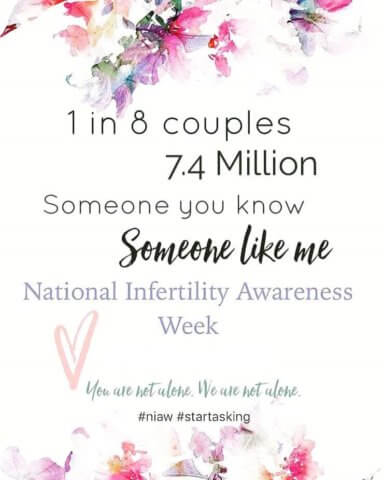This is National Infertility Awareness Week. But as a woman working at a fertility practice, rather than a single week of awareness, I am constantly reminded of my limited reproductive window.
I started working in the field four years ago. The initial few months struck fear into me; women younger than me, couples in love and otherwise healthy were having trouble conceiving. The underlying causes of infertility were often diagnosed, but sometimes the diagnosis was unknown or unexplained infertility. The ability to have a baby decreases in all women as they get older, usually starting at age 35, but the exact age varies based on each woman’s ovarian reserve. The knowledge that I could someday have trouble conceiving had me running to check my fertility status.

Be smart. Talk to your doctor about your fertility potential.
What can I do?
There are several tests that can help show a woman’s fertility potential, or ovarian reserve. That year my blood tests and anterior follicle count were “normal for my age”. It was excellent news. I was so relieved, as was my mother! It relaxed my “deadline” to find a partner, settle down, and start a family. It gave me a sense of security, however I knew that my status could change so I remained vigilant. I told myself that I would recheck my status again in a few years and take steps to freeze my eggs at 35.
Take the Next Step – Schedule an Appointment
Fast forward a few years later, still single and about to celebrate my 30th birthday. I went to my GYN to have another fertility work up. My request was met with resistance – regardless of the fact that I worked at a fertility practice. We debated back and forth on my reasons why I wanted testing. I believe that my knowledge of my specific fertility potential would empower me to make responsible decisions for my reproductive future, regardless of what may happen down the line. My GYN thought the information would be useless unless I was currently trying to conceive.
I was upset that she refused testing for me. But I was even more upset imagining how many other women were denied testing or fertility evaluations at an early age – when they could choose to preserve their fertility – and the repercussions that denial can cause. I have seen too many women /couples who had trouble conceiving due to pre-existing conditions or because they “waited too long.” If they were aware of their health status, they could have sought help sooner rather than later. Or it could have possibly eliminated the need for intervention.
National Infertility Awareness Week

Infertility is a disease of the reproductive system. You read that correctly – it is a DISEASE. And it is more common than you think; 1 in 8 couples, or about 7.3 American women experience difficulty conceiving. However, those that suffer this disease, usually do so in silence. There’s a horrible stigma associated with infertility; especially if you’re blessed with being part of a large fertile family. National Infertility Awareness Week®, (NIAW) is not just about awareness for one week, it is much more than that. NIAW is a movement that, since 1989, has set out to reduce stigma and educate the public about reproductive health and issues that make building a family so difficult for so many. In fact, in 2010, National Infertility Awareness Week became a federally recognized health observance by the Department of Health and Human Services.
How common is infertility?
- Infertility affects approximately 8-10% of all couples.
- Female factors can cause a couple to be infertile 30-40% of the time.
- Male factors are found to be the cause of infertility about 30% of the time.
- In another 30-40% of couples both female and male factors contribute to the couple’s infertility. In about 5-10% of couples, infertility remains unexplained even after a fertility work-up.
Does age really matter?
Many lifestyle magazines that portray celebrities having twins at advanced ages forget to tell us that many (if not most) of them have used egg donors. But when women are inundated with these stories and then must confront the news that their own biological clock has run out of time, who is to blame? Women need to learn – and spread the word – that forty may be the new thirty in fashion, lifestyle and overall health; but your outward appearance really has no bearing on your biological age.
It is so important that women who are interested in having children – regardless of how near (or far) in their future – be aware that infertility is a common problem. Learn the facts, so you can advocate for testing yourself. If delayed childbearing is part of your life plan, be smart and freeze your eggs as early as you can.
Update: I froze my eggs three years after writing this.
Original post April 24, 2017
Updated April 4, 2023
References
If you would like to learn more about GENESIS Fertility New York or are ready to schedule an appointment, please speak with one of our representatives at 718-GENESIS.






